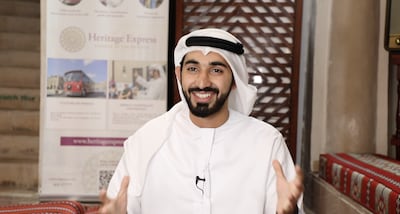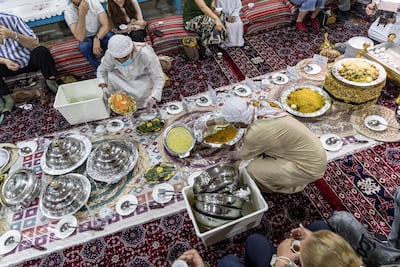“I fondly remember Ramadan growing up as a time the whole neighbourhood would exchange food,” says Mohammed Al Jasmi, who lives in Al Ain.
“It is an important part of our Emirati culture, to share food. Nobody was hungry during the holy month.”
Al Jasmi, now 22, works as a presenter at the Sheikh Mohammed Centre for Cultural Understanding in Dubai's historic Al Fahidi District, where he promotes awareness of the UAE’s heritage and traditions. Every evening during Ramadan, the centre welcomes residents and tourists to give them a taste of an Emirati iftar.

“Another memory from my childhood is that beside every mosque, there used to be a tent,” Al Jasmi tells The National. “Anyone could go to the tent and end his fast there. My mother would always ask me to take the food she cooked and give it to some tent.
“Later at night, I would gather with my cousins and my father, and offer the taraweeh prayer. It's longer than other prayers. And we were kids, so it was a bit hard for me. I wondered if I could just say half of it,” he says, with a laugh.
At 6pm, the Sheikh Mohammed Centre sets up the majlis for visitors. An array of traditional dishes are prepared, including chicken biryani, lamb machboos, lamb margooga and veal harees. There are vegetarian options, too, such as salona or stew, biryani, white rice and salad. There are no tables or chairs as visitors are seated on the floor in line with Emirati customs.
After having their meals, visitors are taken to a mosque where they learn about different kinds of Islamic prayers.

Al Jasmi describes his daily routine during Ramadan.
“I wake up at about 10am because I work in the evening. Most people would work in the morning. Ramadan is more about reading the Quran, thinking about your spiritual self, so I mostly read the Quran. It's something that every Muslim wants to do more during Ramadan. Personally, I also like to read other books about Islam.”
At Al Jasmi’s home, his mother cooks the iftar meal and he shops for groceries during the day. After the call to prayer is heard, he ends his fast with his family.
“Ramadan is a very family-oriented month. We try our best to visit our families, grandparents, cousins, uncles and aunts, and end the fast with them. For suhoor, I could meet my friends but iftar has always been a family affair.”
A special time of the day for him is when he offers taraweeh prayers, which involves reading long portions of the Quran.
“Personally, I would look for Imams who have a nice voice so I can engage more,” he says.
The UAE is a melting pot of cultures from all around the world and Al Jasmi says it makes it all the more important to preserve the country’s identity for future generations.
“I think living with family makes it possible to hold on to our traditions. If you're living individually, you risk forgetting your culture quickly. But when we are living with our families, we have our grandparents, our parents, and they keep us grounded. They tell us how our ancestors used to live in the desert and how hard their life was.”
“It's something that we must continue to share, not just with our future generations but also with people who don't know about it.”
Ramadan in the past: 'I fondly remember gathering in majlises with the elder generation'
The holy month wasn’t always about staying up late and a glittering nightlife. Back in the day, Ramadan was much quieter, explains Abdallah bin Eisa Al Serkal, director of the Sheikh Mohammed Centre for Cultural Understanding.
“I grew up in my grandfather's house who was born in 1913,” says Al Serkal, 56.
“As a teenager, I fondly remember gathering in majlises with the elder generation after the taraweeh prayer. The younger generation would just listen to the elders' discussions. There would be talks on everything from history, lifestyle, business, politics to sports.”
“Things changed in the '90s as people started going out more, and more shopping malls were built. I don't know why it became a culture to stay [out] late at night, which is not a real Ramadan practice. For older people, waking up early and continuing with the day’s work was any regular day of the year, not just during Ramadan. Ramadan is about discipline. It is about how much you can give.”
“Nowadays, people stay late, even friends gather in majlises and they would have a meal until 2am. There are majlises for women, for men, for the older generation as well as younger the generation.”
Ramadan tents are back in the UAE this year for the first time since the coronavirus pandemic began in 2020 Al Serkal says the past two years gave people the opportunity to bond with their families.
“It was a strange, good thing for the whole world. You felt your children, you felt your grandchildren, your wife, your brothers, you felt your family. You felt your mother and your father. It was about yourself. Ramadan was quiet, but it was going back to the real family and being with them,” he says.
“Nothing is more important. No fancy cars, no stylish dresses, no showing off.”











